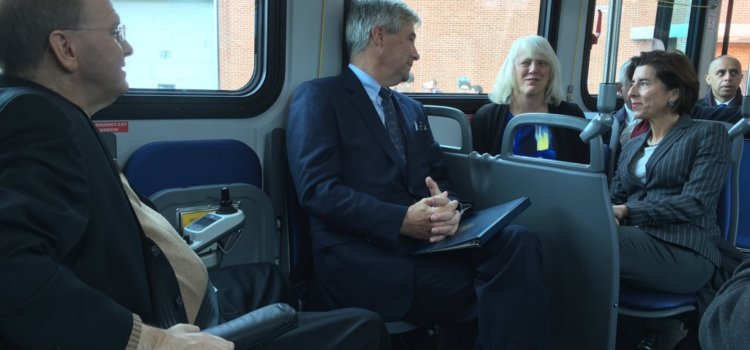1. What differentiates you from your opponent(s)?
- It is my experience working for middle class Rhode Islanders that differentiates me from my opponent. I have fought tirelessly for our state’s working class families. All families deserve a fair shot at achieving the American dream, and that means quality and affordable healthcare, good jobs with good pay, and quality education.
I am proud of my record fighting for Rhode Island seniors and people with disabilities against Republican efforts to privatize Social Security, Medicare, and Medicaid. I also continue to work on policies and funding to improve our nation’s career & technical education programs so workers have the skills to succeed in 21st Century jobs.
I have nearly two decades of experience fighting for Rhode Islanders, and I know how to be their champion in Washington.
2. Explain what you see as the most important issue facing the state, and how you believe it should be addressed.
- Rhode Island’s economy is on the rise, but in order to see sustained, long-term growth, we need to do a better job of closing our skills gap and aligning what is taught in the classroom with the skills our local businesses need. Our hardworking students deserve good-paying jobs and Rhode Island’s businesses need workers who are ready to work on day one. I was proud to fight for increased career and technical education funding to address this skills gap, but there is still more work to do. I remain committed to fighting for the necessary resources at the federal level to ensure all Rhode Islanders have the opportunity to succeed with 21st-century skills, in the 21st-century economy.
3. RI is scheduled to expand tractor trailer tolling along I-95. Do you agree with those expansion plans?
- This is a state issue that will be determined by the General Assembly and Governor.
4. Are the current gun laws in Rhode Island too strict, too weak, or just right? If not just right, what needs to be changed? Should teachers and/or other school employees who are not law enforcement officers be armed?
- Many federal laws affect gun safety for Rhode Island residents. While I support the second amendment, I believe in common sense gun safety laws. I support universal background checks, and closing the “gun show loophole”. I am also strongly opposed to efforts to impose “concealed carry reciprocity,” which would invalidate state laws relating to carrying a concealed handgun and instead allow most people to carry automatically. I am also fighting for federal support for strong child access protection laws that hold parents accountable when their child accesses an unsecured gun. As someone who was injured, albeit accidentally, at the hands of well-trained professionals, I reject the notion that arming teachers will keep our kids safer, and help reduce risks in schools.
5. Under what circumstances would you support the legalization of marijuana for recreational use in Rhode Island?
- I support the rights of states to develop medical marijuana rules, and I hope more research will be conducted into its medical uses. To that end, I have voted for legislation that prevents the Department of Justice from interfering with state medical marijuana laws. However, marijuana remains a restricted drug at the federal level, and, absent further research, I do not support changing that designation for recreational purposes.
6. Are you satisfied with the way sports betting is being implemented in Rhode Island?
- Sports betting was regulated at the federal level until a Supreme Court decision earlier this year. Because the ruling was so recent, it is too early to say whether Congress should step in again and introduce new laws relating to sports betting or whether it should be left to the states. I will continue to monitor this issue as new state approaches emerge.
7. Is the minimum wage in Rhode Island too high, too low, or just right? If not just right, what should it be?
- I believe the minimum wage in Rhode Island is too low, which is why I support federal legislation to increase the minimum wage for all states to $15 per hour by 2025. I don’t think anyone should work a 40-hour workweek and still live below the poverty level. Hardworking Americans should be able to support their families with fair compensation.
8. What are your thoughts about the ongoing opiate crisis? Are current local and national policies appropriately addressing it?
- I have been devastated by stories I’ve heard from Rhode Islanders who have been personally affected by the opioid overdose epidemic. Addiction is a public health crisis that we must use a comprehensive approach to address, with a particular focus on treatment and counseling. I am proud to have worked with the federal delegation to support the opioids bills that have been signed into law over the past two years to bring millions of dollars to Rhode Island to help with prevention and recovery. I have also introduced legislation that would improve collaboration between local, state, and federal law enforcement when it comes to interdicting potent narcotics like fentanyl at the border.
9. What national issue or controversy do you believe resonates most deeply in Rhode Island?
- Constituents across my district are deeply concerned about quality affordable healthcare. They are worried about rising costs and if they will be denied coverage if their preexisting conditions are no longer covered under the Affordable Care Act (ACA). We must work together to make healthcare more affordable and accessible for all Rhode Islanders.
10. What is an example of a policy or issue you have changed your view on in the last 20 years?
- I strongly oppose discrimination based on sexual orientation or gender identity. However, for much of my legislative career, I did not support same-sex marriage, believing instead that civil unions were sufficient. It was not until 2011, three years after I attended the commitment ceremony of one of my long-time staff members, that I finally understood that preventing same-sex couples from achieving full marriage equality was, in fact, a form of discrimination. Since then, I have proudly fought for full marriage equality.
BONUS ROUND – ANSWER ANY OR ALL OF THESE QUESTIONS:
1. What has drawn you to public service?
- I have always had a strong desire from an early age to serve my community. Growing up, I wanted to be a police officer, and perhaps going on to become an FBI agent. When my accident ended my law enforcement dream, the outpouring of support that I received from the community inspired me to give back and pursue a career in public service.
2. Who is your political hero? Why?
- I will list two: President Franklin Roosevelt and Senator Claiborne Pell. As President, FDR guided the nation through one of the most difficult, tumultuous times in our history, and he never let his disability get in the way. And Senator Pell was a champion of good public policy for Rhode Island and the nation. He didn’t care about taking credit and he always put his constituents first.
3. Under what circumstances would you tell a lie?
- As President George Washington said in one of my preferred fables, “I cannot tell a lie.” I think this a good philosophy for all of us to follow.
4. What is the best advice you have ever gotten?
- The best advice I have received is from the late and former State Representative Paul Sherlock, one of my oldest political mentors. He told me that the key to being successful in public service is to be “accessible, responsive, and to never embarrass your constituents.” I have taken this advice to heart, and it has been a guiding principle throughout my career in public service.
5. Top item on your “bucket list?”
- I’d love to visit the Egyptian pyramids.
Name:
- the last live music concert you saw:
- U2
- the last movie you saw in a theater:
- “Mission Impossible: Fallout”
- the TV show you never miss, or the last one you binge-watched:
- Game of Thrones
- What sports team(s) (Pro, college, Little League) do you cheer the loudest for?:
- Patriots
- What question do you wish someone would ask you and what would your answer be?:
- I would like to hear from someone who is considering entering public service and would like to know if it is worthwhile. I would them know that it certainly is. While the intensity of today’s political climate may be intimidating, it’s absolutely critical to get involved. We are in desperate need of good people in the public arena who are in public service for the right reasons.










